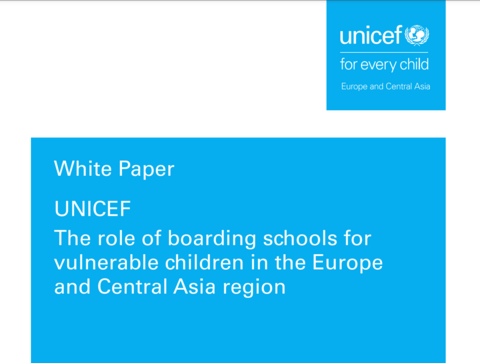The UNICEF ECA Regional Office (ECARO) has commissioned this paper as a result of concerns that many vulnerable children are being left behind in large boarding schools and about the quality and appropriateness of the care and education provided by many boarding schools. The lines between the role of boarding schools as providers of education and as providers of alternative care are already blurred. They may become more so as governments look to transition from child protection systems that have depended primarily on institutional care, to child protection systems that are more supportive of families and that provide more family-based alternative care. A new and important discussion has emerged that focuses on a number of core questions, addressed in this paper:
- Should boarding schools be classified as ‘alternative care’?
- Are boarding schools an appropriate form of education and alternative care provision for vulnerable children?
- If so, how should the concerns and challenges around their use be addressed?
- If not, how is demand for such provision best reduced, and what is the best form of education and alternative care for the vulnerable children who are affected? The paper summarises evidence on the current use and impact of boarding schools in the ECA region and draws on wider international evidence. It proposes a typology of boarding schools and considers the drivers for their use, as well as the concerns and challenges related to that use for vulnerable children, particularly children who are in vulnerable situations such as those affected by poverty, who have no parental or family care, who are socially excluded, and those at risk of violence or abuse. While its conclusions and recommendations focus on the boarding schools of the ECA region, they may also apply to other types of boarding schools, including elite boarding schools in other parts of Europe and internationally. The evidence on the risks of violence and abuse in residential settings indicates that all children in boarding schools may be classified as ‘vulnerable’.
The paper aims to promote better decision-making among policymakers, local governments and service providers, including non-governmental organisations (NGOs), as well as child welfare and other allied practitioners. The paper supports education as a fundamental and critical right for every child, but emphasises that this right must not be realised at the expense of a child’s right to grow up in a safe and loving family environment. State parties to the Convention on the Rights of Persons with Disabilities (CRPD) must uphold articles 19 and 23 (right to life in the family and in the community for children with disabilities) and article 24 (right to a quality inclusive education in mainstream schools alongside children without disabilities). The paper is also based on the assumption that a comprehensive childcare system should aim to provide family care to all children.

